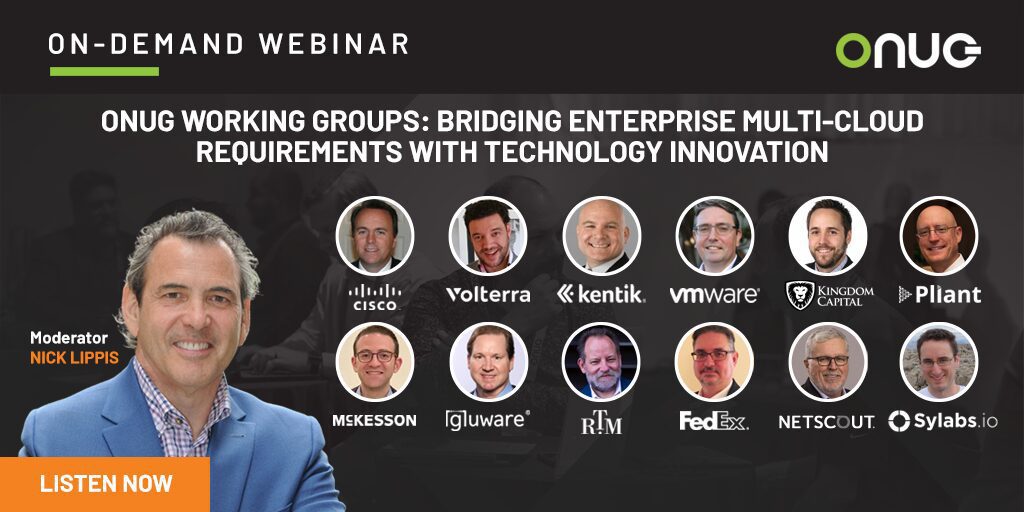Bridging Enterprise Multi-Cloud Requirements with Technology Innovation
Working groups serve as ONUG’s vehicle for generating industry change. They represent the requirements of the enterprise cloud community and work to develop common solutions to critical digital transformation challenges faced by the Global 2000.
ONUG Board member Global 2000 companies, and cloud end users are placing their collective buying power – nearly $500 billion spent annually on IT – behind the working group process of defining use case requirements and generating multi-vendor reference solutions
Join us in this webinar and hear about the initiatives the ONUG Working Groups are undertaking to address Enterprise Multi-Cloud challenges. Join an ONUG Working Group and collaborate with the end user community to develop and deliver the products and services that today’s enterprises are demanding to accelerate their digital transformation strategies.
Multi-Cloud Container Security Working Group
The ONUG Multi-Cloud Container Security Working Group delivered a reference architecture focused on deploying containers into untrusted environments. The group published its reference architecture in this https://github.com/onug/container_security repo and demonstrated the reference architecture during ONUG Digital Live. Hear about what this group is doing with encryption within containers, taking this work to the next level.
SDWAN 2.0/Elastic Infrastructure:
Requirements for hybrid and multi-cloud infrastructure have changed due to the COVID-19 pandemic. Remote Workforce (RWF) infrastructure has been deployed widely and is now in an optimization posture, corporate campuses are being scaled back, use of cloud services have scaled up, etc. In short, corporations need much more flexibility and elasticity in their infrastructure. The SD-WAN 2.0 Working Group expanded its focus to encompass elastic infrastructure which incorporates SASE, zero touch network access, 5G and edge computing access. In this session, working group leaders share the current thinking on elastic infrastructure and ask the ONUG community to contribute requirements and to participate in its working group. The way we do wide area networking is now fundamentally different; here is your chance to have input into how WANs are envisioned and deployed.
Orchestration & Automation (O&A) Working Group
Among the newest working groups, Orchestration & Automation (O&A) first focused on defining the landscape and published the O&A taxonomy and use-case paper at ONUG Digital Live in May. Hear about the upcoming white papers on business case and ROI topics as well as an O&A assessment document; both papers will be available to ONUG Fall attendees. O&A is also considering work in new areas including challenges related to hybrid cloud infrastructure and API integrations.
AIOps/Observability
Hear from the AIOps Working Group on efforts in the AI realm, as they seek to show that data, required by several intelligence engines, can be provided “while sitting in place on each platform” (wireless, DC, Campus, voice, data). With an AI/ML engine running, this working group seeks live data streams (provisioned in place) to provide insights and more accurately refine use cases. ONUG Working Group members willing to provide live data and use cases will gain access to leading edge technology platforms as we validate our capabilities to work across vendors.
What Attendees Will Learn:
- How the ONUG Working Groups liaison with and interact with key enterprise end users to address common challenges throughout the industry
- The defined challenges and specific issues each working group is undertaking and how your company can get involved
- How working groups represent the true reality of what the enterprise end users are facing
- An overview of how each working group is addressing specific challenges in these areas of focus
- Observability
- Security
- SD-WAN integration
- Orchestration & automation
- AIOps
Who Should Attend?
Company Types:
- Public and Private Cloud Providers
- Cloud Hardware and Software Vendors
- Enterprise Cloud Consumers
Job Titles
- Cloud Engineers
- Product Managers
- Software Architect
- Software Engineer
- Business Development
- Revenue Officers
- Enterprise Cloud Architects



